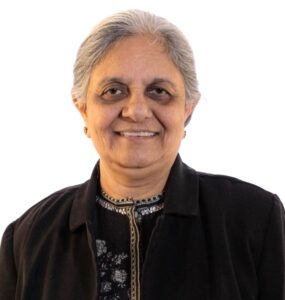
Sushma Niranjan Jani, MD, always knew she wanted to pursue a career in psychiatry. Coming from modest means, her father dreamt that she would one day become a doctor from the day she was born. For more than 20 years, Dr. Jani has employed her talents as a pediatric emergency physician with Howard County Hospital. In 2005, she became the chief medical officer of Maple Shade Youth and Family Services, where she works to provide therapy and psychiatry services for individuals and families in the region. Extremely active in her field, Dr. Jani became the medical director of Community Behavioral Health in 2012.
Dr. Jani attended medical school at just 17 years old. Her father paid for her to pursue her higher education with everything he had, and though she faced difficulties adapting at first, she rose to become first in her class through sheer tenacity and hard work. She graduated with a Bachelor of Medicine and Bachelor of Surgery from her medical college in Ahmedabad, India, after which she immigrated to the United States in 1983. Dr. Jani obtained a Doctor of Medicine in adult psychiatry from Indiana University in 1984 and matriculated at Johns Hopkins University, which had always been her dream school. She is incredibly proud to have graduated from the latter, esteemed institution with her second Doctor of Medicine, this time in child psychiatry, in 1987.
Dr. Jani is highly qualified, respected, and sought after in her field. As a diplomate of the American Board of Psychiatry and Neurology’s sub-board in child psychiatry, she is certified through the American Society of Addiction Medicine and is a certified medical review officer. Dr. Jani stays up to date with her discipline as a member of the American Medical Association, the American Academy of Child & Adolescent Psychiatry, the American Psychiatry Association, the Maryland Psychiatric Society, and the American Society of Addiction Medicine, among multiple other organizations.
Following her higher education, Dr. Jani worked for the Johns Hopkins University Hospital in Baltimore, Maryland, as a child psychiatrist. She secured experience as an assistant clinical professor with the Georgetown University Medical Center and later rose to become an associate professor of pediatrics and psychiatry. From 1997 to 1999, Dr. Jani was a pediatric emergency physician at Mercy Hospital Baltimore. Transitioning into administrative roles, she worked as the medical director for the Chesapeake Network of the Devereux Foundation and the Riverside Hospital. From 2009 to 2012, she shared her knowledge as a subject matter expert with the Defense Centers of Excellence for Psychological Health and Traumatic Brain Injury, part of the U.S. Department of Defense. Moreover, at the University of Maryland, Baltimore, she worked as an associate clinical professor from 2010 to 2012.
With a legacy community involvement dating back to her life in India, Dr. Jani was a volunteer for the Radha-Krishna Leprosy Camp in Bombay, India, from 1981 to 1983. She was a consultant and psychiatrist for the veterans’ hospital in Indianapolis, Indiana, from 1986 to 1987 and accrued further experience as a chief consultant and psychiatrist for the Baltimore Detention Center from 1988 to 1989. In recognition of her decades of professional experience and commitment to helping others, Dr. Jani was recognized with the Albert Nelson Marquis Lifetime Achievement Award and was named a Marquis Who’s Who Top Doctor.
Working in an underserved part of Maryland, Dr. Jani has made it her mission to create a health service model that works for poorer communities. She is developing this model with the aim of overcoming the stigma surrounding mental health issues in society. Dr. Jani loves what she does and has been proud to see two of her children follow her into medicine. Her son is a neurosurgeon, one of her daughters is a Harvard graduate child and adolescent psychiatrist, and her other daughter works as an engineer. Throughout her career, Dr. Jani believes that all her setbacks and failures have ultimately motivated her to work harder and keep moving forward. In the future, she hopes that the success of her developing model for providing health care access to underserved communities will be her enduring legacy.
